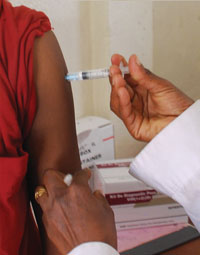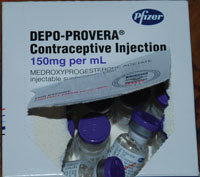Progesterone-only injectable contraceptives (POIs)
DMPA (Depo-Provera)

DMPA (Depot Medroxy Progesterone Acetate, or Depo-Provera) is an artificial progestin preparation which resembles the naturally occurring female hormone progesterone. It is usually given in doses of 150 mg, which gives three months' protection following injection. It is the most widely available and commonly used injectable contraceptive in Ethiopia.
In what situations would you advise a client to choose an injectable contraceptive over an oral contraceptive?
When the client wants to prevent pregnancy for a long period of time, and is having difficulty remembering to take an oral contraceptive pill on a daily basis, then having an injectable contraceptive every month is preferred (Figure 6.2).
Mechanism of action of DMPA
In Study Session 5 of this Module, you learnt the mechanism of action of progesterone-only oral contraceptives. Progesterone-only injectable contraceptives have the same mechanism of action as that of the progesterone-only oral contraceptives, except that injectable contraceptives have a longer duration of action.
Can you explain how progesterone-only contraceptives prevent pregnancy?
Progesterone-only contraceptives, including progesterone-only injectables (POIs), prevent pregnancy in the following ways:
- Inhibition of ovulation (the primary mechanism of action)
- Thickening of cervical mucus to stop sperm penetration
- Thinning of the endometrium of the uterus to make it unfavourable for implantation of the fertilised egg
- Slowing of sperm and ovum transport through reduced fallopian tube peristalsis (wave-like muscular contractions of the fallopian tube by which contents are forced onward towards the uterus).
How effective is DMPA?
DMPA is very effective. In the first year of use only about 0.3 pregnancies per 100 women occur, that is, one pregnancy for every 333 clients who do not get pregnant, providing the injection is given every three months (Figure 6.3).

Why do you think injectable contraceptives are more effective when compared to oral contraceptive pills?
Injectable contraceptives avoid passage through the gastrointestinal tract, and metabolism in the liver.
Advantages of DMPA
DMPA is very effective, and has the advantage for the client that it can be used privately without the knowledge of any other person, including their partner. It also has the advantage of being long acting, but reversible if the client later decides to have a child. Moreover, it does not interfere with sexual intercourse. It is also suitable for breastfeeding women (after six weeks post-partum) because it has no oestrogen side-effects.
DMPA has proved to protect against ectopic pregnancy, since ovulation does not occur. However, if ovulation does occur, the chance of ectopic pregnancy is higher than for women not using DMPA. Why does this happen? This is because DMPA reduces fallopian tube peristalsis, which in turn slows the transportation of fertilised eggs from the fallopian tube to the endometrium and, as a result, there is a high chance of implantation in the fallopian tube.
It is important for you to know some of the other contraceptive benefits of DMPA. Scientific research has shown that it helps prevent uterine tumours, may protect against pelvic inflammatory disease by making the cervical mucus thick and impenetrable for microorganisms, and finally it reduces the chance of seizures in women with epilepsy. The advantages and disadvantages of DMPA are summarised in Table 6.1.
Disadvantages of DMPA
In most women, the use of DMPA is associated with disturbance of the menstrual cycle. This can include absence of menstrual periods or monthly bleeding (amenorrhoea) for an unspecified period of time. Also, there can be prolonged menstrual flow, light vaginal bleeding at any time other than during the menstrual period (spotting between periods), or heavy bleeding, which usually occurs during the first two to six months of use. It can increase the appetite of some women, resulting in weight gain. It does not protect couples against sexually transmitted infections (STIs), including the human immunodeficiency virus (HIV).
There can be a delayed return to fertility after stopping DMPA. Most women take an average of four to six months longer than usual to get pregnant, but this may extend to one year in some women. This is because residual levels of DMPA exist for several months in the body after the end of contraceptive protection following the final injection.
Do DMPA injectable contraceptives cause infertility?
No, DMPA does not cause infertility. It is a completely reversible contraceptive, but after stopping DMPA there can be a delayed return to fertility of four to six months.
Table 6.1 Summary of the advantages and disadvantages of DMPA
| Advantages | Disadvantages |
|---|---|
|
Very effective. |
Disturbance of menstrual cycle. |
|
Maintains privacy. |
Delayed return of fertility. |
|
Reversible. |
No protection against STIs. |
|
Suitable for breastfeeding women; no oestrogen side-effects |
Increased appetite causing weight gain for some women. |
|
Best choice for those with gastritis or peptic ulcer diseases (ulcer of stomach or duodenum). Protects against ectopic pregnancy. |
Other side-effects include headache and dizziness, breast tenderness, nausea, hair loss, acne and loss of sexual feeling. If ovulation occurs, the chance of ectopic pregnancy increases. |
Management of side-effects and problems of injectable contraceptives
DMPA cannot be given to all women. In particular, it is not recommended for pregnant women, or those with breast cancer, or where a client has a history of diabetes (increased blood glucose level), advanced heart or liver disease, severe hypertension (increased blood pressure), or frequent severe headaches.
If a woman comes to you with concerns associated with this injection, do not underestimate or ignore her. Reassure her that the side-effects are not dangerous. Remember that counselling after side-effects have occurred is still useful, but not best practice. The best time to counsel a client about side-effects is when they make their contraceptive method choice. This is because many women encountering side-effects may not come to you at all, so it is important that you have given them the information beforehand.
First, you should advise her to wait until the effective days of the injection have passed. Then, if she is concerned about not having her monthly period, for example, she may want to change to another method. With irregular bleeding, reassure her that it is not harmful and usually reduces or stops after the first few months of use. On the other hand, if the bleeding is profuse and continuous, you should refer her for further investigation and management at the health post or hospital, as there may be another cause.
If she is suffering from headaches, suggest she takes Aspirin (500 mg), Ibuprofen (400 mg) or Paracetamol (500 mg), as needed, and provide her with the pain killer of her choice. Be aware that Aspirin and Ibuprofen may not be tolerated by a woman with gastritis or peptic ulcer diseases. In general, if her condition is severe, or if she is unhappy with your advice, refer her to the nearest health centre or hospital.

Timing of, and techniques for, DMPA injections
Box 6.1 summarises the most appropriate times to start DMPA injectable contraceptives.
Box 6.1 When to start DMPA injections
- In the first seven days after menstrual bleeding starts.
- Six weeks after childbirth, or at any time once menstruation has returned, indicating the woman is not pregnant.
- Immediately, or on the seventh day after childbirth, if your client is not breastfeeding.
- Immediately, or on the seventh day after a miscarriage or abortion.
- Immediately after stopping another method.
The injection site should not be massaged or pressurised, as this may accelerate absorption of the drug.
Injectable hormonal contraceptives are different from other injections because they are administered using deep intramuscular injection techniques (Figure 6.4). The vial must be shaken strongly before it is drawn into the syringe, to ensure the active ingredient is in suspension and not in the bottom of the vial. Following the procedure, the injection site should not be massaged or pressurised, because this may accelerate absorption of the drug. Infection prevention procedures are important (see Section 6.3 of this session).
Reinjection schedule
When the client comes to you to have her next or subsequent injection, you should check your records to see when you last gave her an injection. If it is the correct appointment date, give her the injection. If she comes to you up to two weeks before her appointment, or up to one month after her scheduled appointment, you can still give her the injection. But if she is more than one month late, she can get another injection that day only if you can be sure that she is not pregnant.
She is unlikely to be pregnant if:
- she has had no sex since the day of her last injection
- she has used condoms or another method every time she has had sex since the end of her last injection
- she had a baby less than six months ago, is fully, or nearly fully, breastfeeding, and has not had her period since
- she has taken emergency contraceptive pills after every sex act since her last injection.
Noristerat
Noristerat (NET-EN or norethisterone enanthate) is another artificial progestin preparation which resembles the natural female hormone progesterone. It is usually given in doses of 200 mg which gives two months' protection after injection. It suits clients who want to prevent pregnancy for a relatively shorter period than DMPA users. Although this method is not available in Ethiopia, it is important to understand that all the mechanisms, effectiveness, advantages and disadvantages are similar to DMPA, except that its duration of action is shorter.